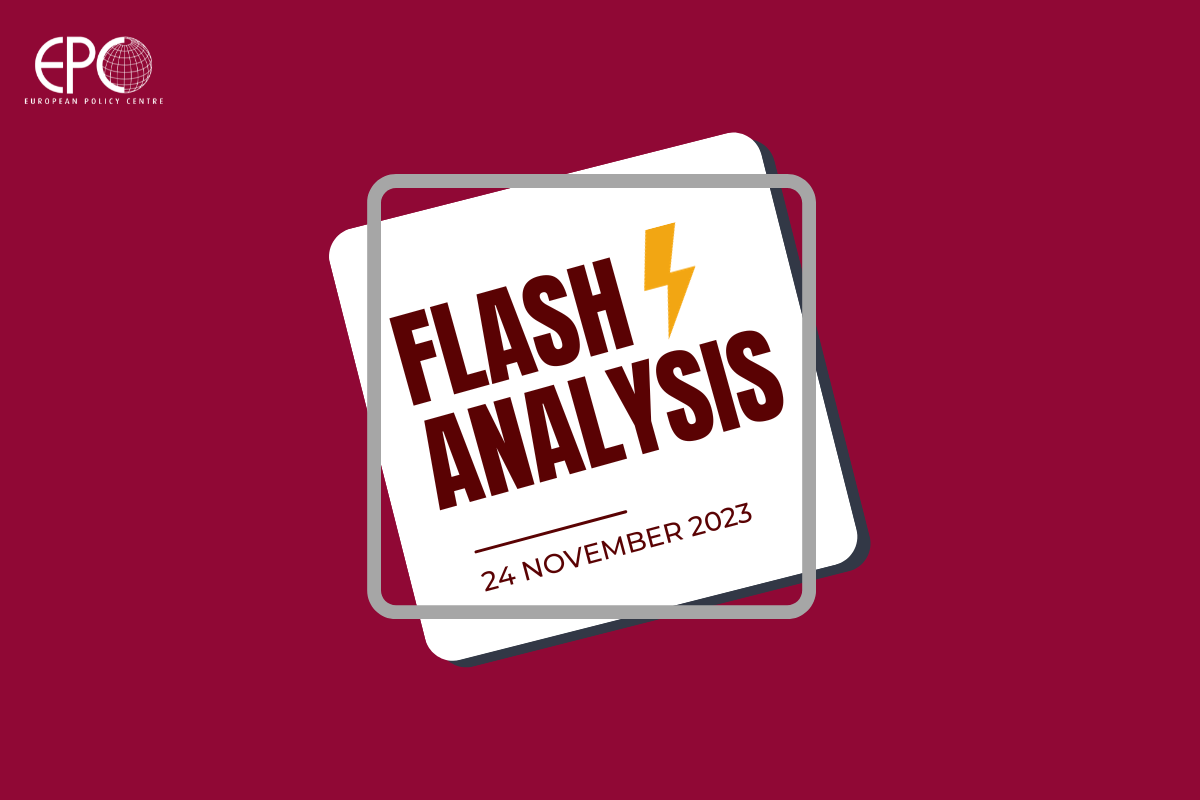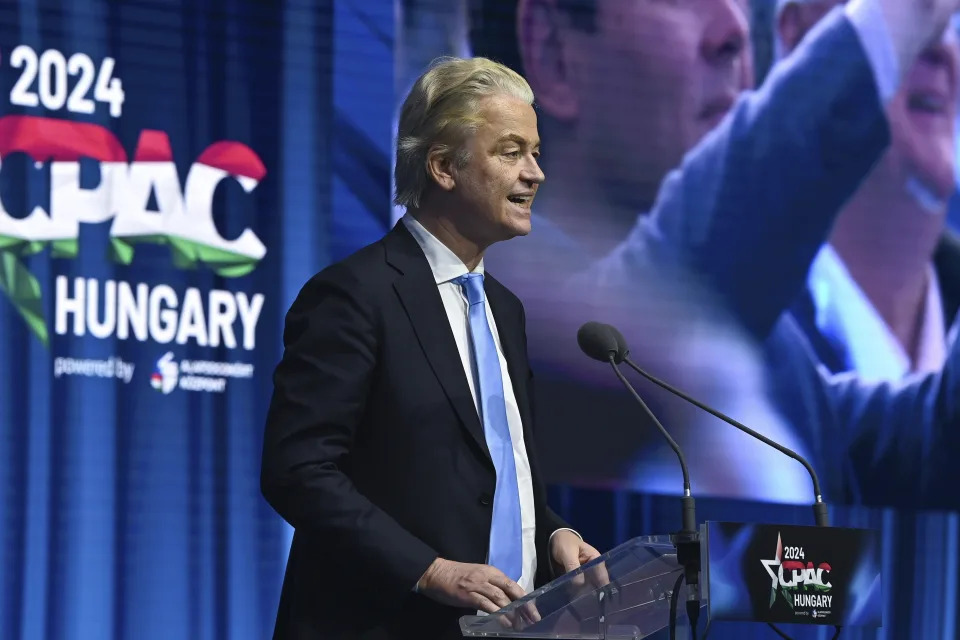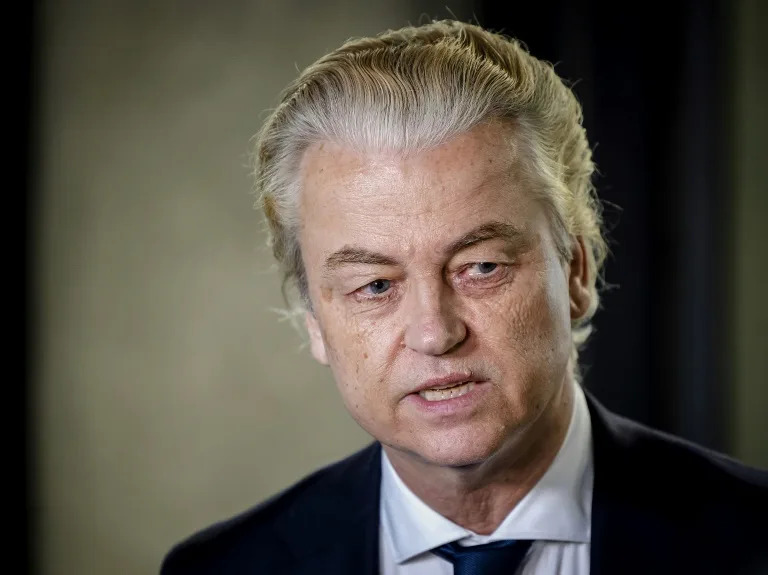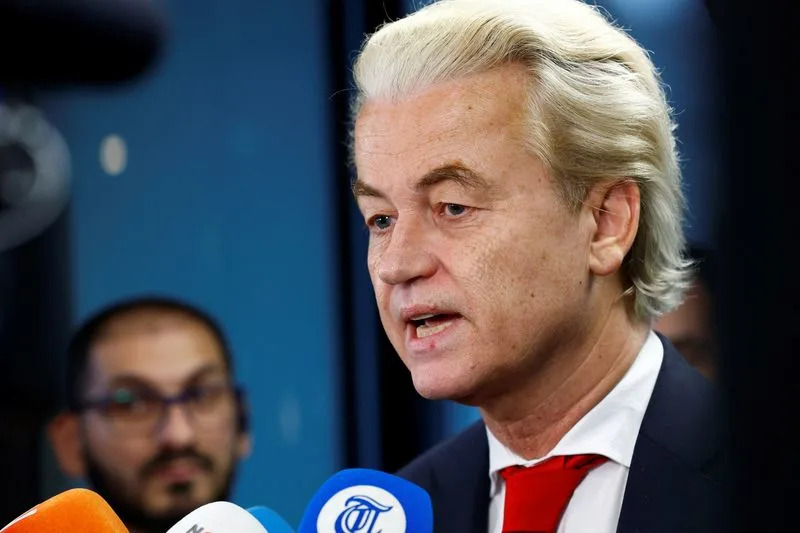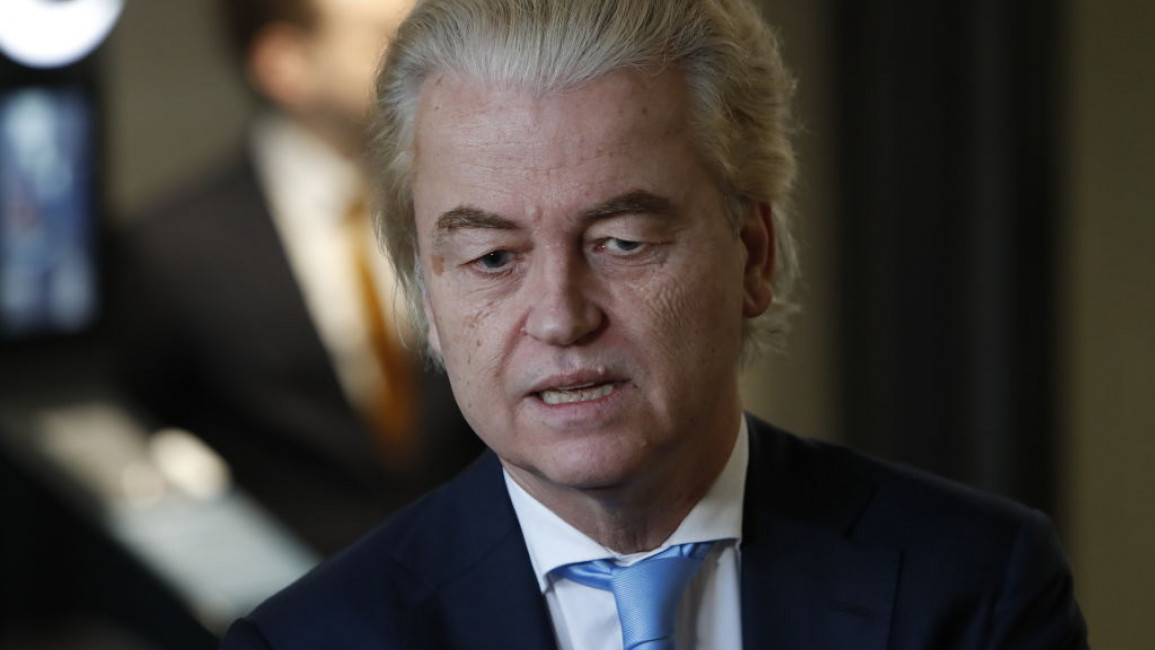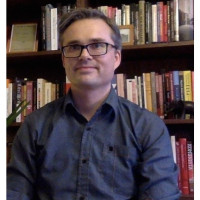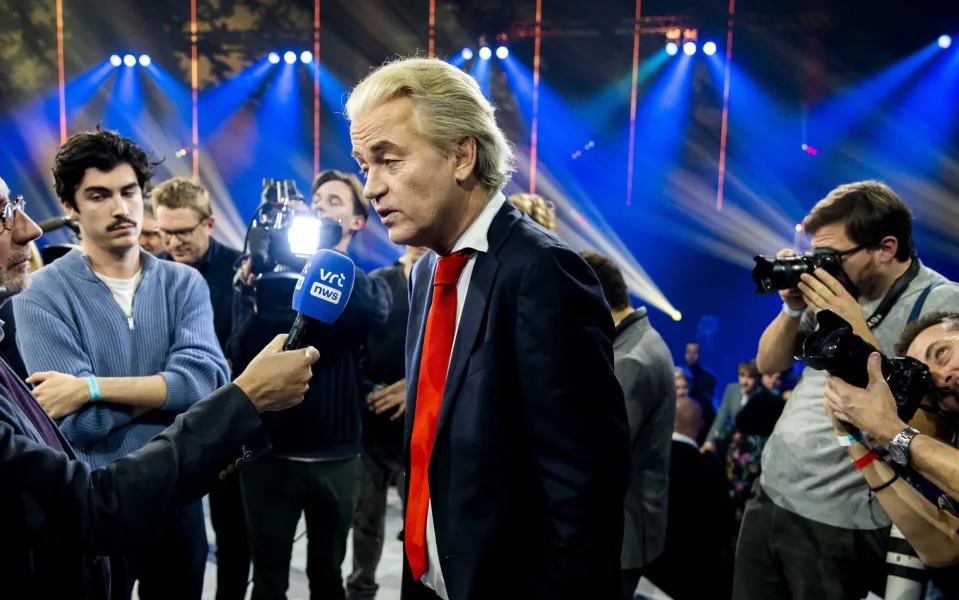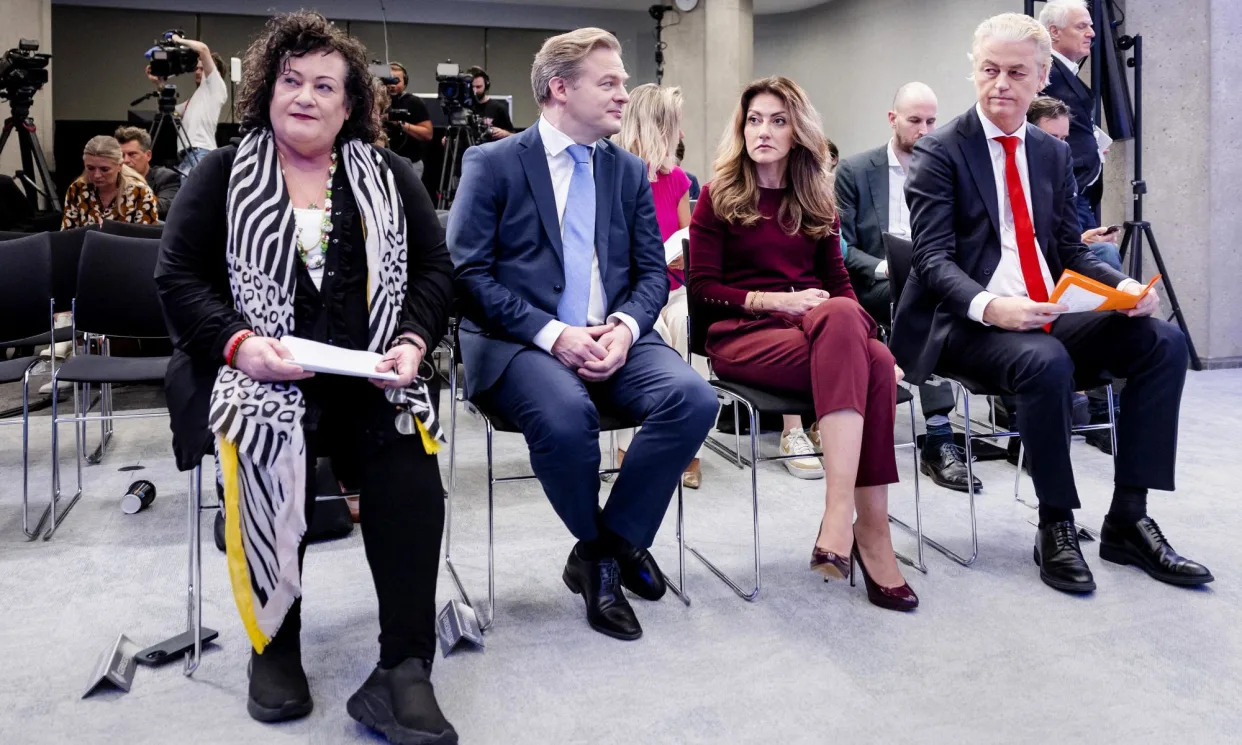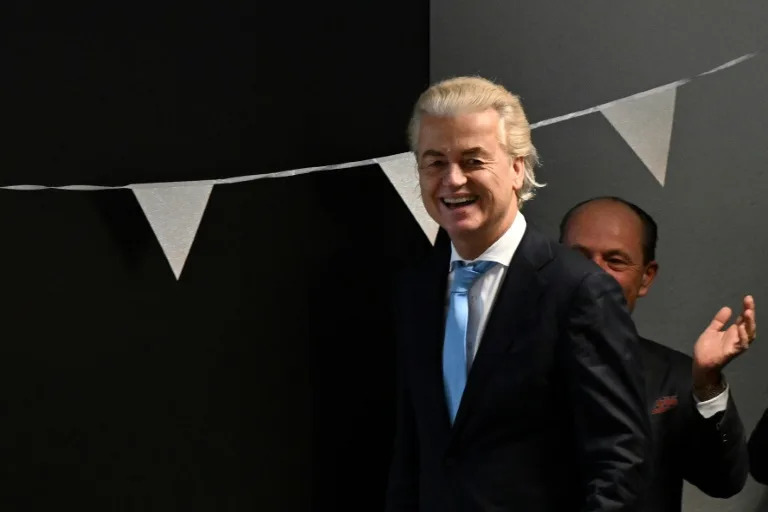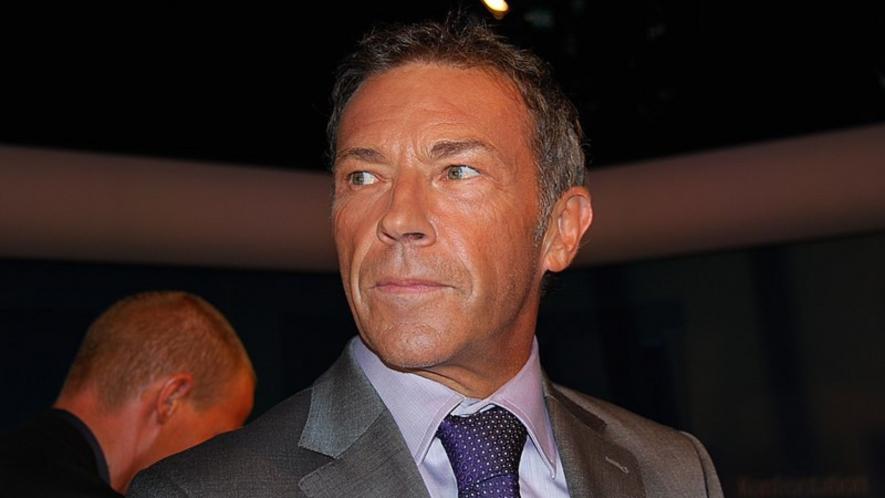The recent electoral success of Geert Wilders' Party for Freedom in the Netherlands signals a broader trend of right-wing populism in Europe, challenging traditional politics and raising concerns about the future of liberal democracy on the continent.
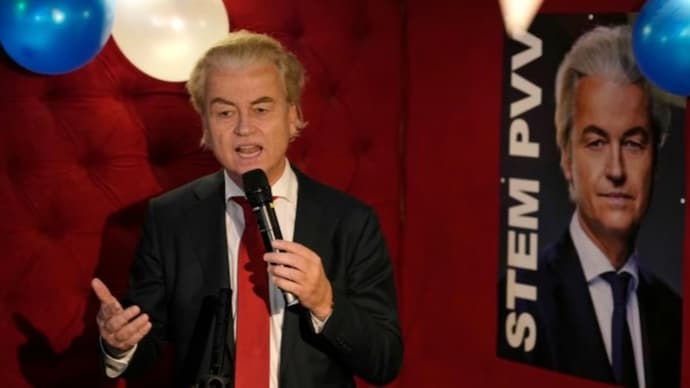
Geert Wilders, leader of the Party for Freedom, known as PVV, speaks during an event (Credits: AP)
Geeta Mohan
New Delhi,
Edited By: Vani Mehrotra
The recent success of Geert Wilders' Party for Freedom (PVV) in the Netherlands marks a pivotal moment. Wilders, a divisive figure in Dutch politics, has led the PVV to a significant victory in the latest elections, winning approximately 37 of the 150 parliamentary seats, a substantial increase from their previous count. This outcome signals a potential shift in Dutch politics, moving away from the centrist governance that has dominated under Mark Rutte's leadership.
Geert Wilders, leader of the Party for Freedom (PVV), has become a central figure in the changing political climate of the Netherlands. Born on September 6, 1963, Wilders has been at the forefront of Dutch politics since founding the PVV in 2006. His political journey started much earlier with his election to the Netherlands' national parliament in 1998. Initially, a member of the conservative-liberal People's Party for Freedom and Democracy (VVD), Wilders left in 2004 due to disagreements over the EU accession of Turkey, forming his own party, the PVV. Known for his criticism of Islam and the European Union, Wilders' views have made him a polarising figure both domestically and internationally.
Geert Wilders: A Polarising Figure
Wilders, who has been at the helm of the PVV since its establishment in 2006, is known for his strident criticism of Islam and the European Union. His political journey began within the People's Party for Freedom and Democracy (VVD), but he defected in 2004 due to disagreements over the party's stance on EU policies, particularly due to disagreements over the EU accession of Turkey, forming his own party, the PVV. Wilders’ views have shaped the PVV's political platform, which advocates for strict immigration controls, particularly from Muslim countries, and opposes the construction of new mosques. His rhetoric has not only made him a prominent figure in Dutch politics but also a contentious one on the international stage.
PVV's Ideological Stance and Electoral Strategy
The PVV's platform reflects a broader European trend of populist right-wing parties gaining ground. The party's stance on issues such as immigration control, tax reductions, and stricter policies on drugs and infrastructure investment mirrors the populist approach of the late Rotterdam politician Pim Fortuyn. Wilders’ willingness to compromise on some of his more extreme views, particularly his anti-Muslim rhetoric, for the sake of forming a government, indicates a strategic shift aimed at transforming electoral success into tangible political power.
The Growing Far-Right Trend in Europe
Hungary: Viktor Orbán's Fidesz party has significantly altered Hungary's political environment, emphasising national conservatism and anti-immigration policies. The party's approach has raised concerns about the erosion of democratic norms and press freedom, highlighting the challenges that such shifts pose to the European Union's liberal democratic values.
Poland: The Law and Justice Party (PiS) in Poland has taken a similar route to Hungary's Fidesz, focusing on traditional family values, national sovereignty, and challenging EU norms, particularly concerning the judiciary and media freedoms. The PiS represents the growing influence of nationalist and conservative ideologies within the region.
Italy: The rise of Giorgia Meloni's Brothers of Italy and Matteo Salvini's League has reshaped Italy's political landscape. Both parties champion nationalist and anti-immigrant policies, reflecting broader European concerns about sovereignty and cultural integrity.
Sweden: The Sweden Democrats, initially rooted in neo-Nazi ideology, have gained significant electoral support, capitalising on societal concerns about immigration and cultural integration. Their rise indicates a shift in Swedish politics towards more nationalistic and conservative views.
France: Marine Le Pen's National Rally, a key player in French politics, focuses on nationalism, anti-immigration policies, and Euroscepticism. The party's influence has been significant in shaping the national discourse around these issues.
Spain: In Spain, Vox has emerged as a significant force, advocating for national unity against regional separatism, stringent immigration control, and traditional values. The party's rise is in part a response to issues surrounding Catalan independence and reflects a broader European trend of right-wing populism.
Germany: The Alternative for Germany (AfD) began as a Eurosceptic party but later adopted far-right positions, focusing on anti-immigration and anti-Islam policies. The AfD's rise is indicative of the broader challenges that Germany faces in terms of integrating immigrants and managing cultural change.
These far-right parties across Europe share a common thread in their appeal to public concerns over national identity, sovereignty, and the cultural impact of immigration and European integration. Their ascent reflects the complex interplay of economic uncertainties, cultural fears, and a perception among voters of being left behind by globalization and traditional political elites.
Implications and Future Outlook
The rise of Geert Wilders and the PVV in the Netherlands, along with similar trends in other European countries, signals a transformation in the political discourse of the continent. These shifts towards the far right challenge the liberal democratic order and the values of pluralism and tolerance. They underscore the need for traditional political forces to address the underlying causes of voter discontent, such as economic inequality, cultural integration challenges, and effective governance while upholding democratic norms and institutions.
The trajectory of these nations' politics will have significant implications for Europe's future, both in terms of internal cohesion and its global standing. As traditional political landscapes continue to evolve, the responses to these changes will be crucial in shaping the direction of European democracies.
In the Netherlands, the challenge for Wilders and the PVV will be to navigate the complex coalition dynamics inherent in Dutch politics. Despite their significant electoral gains, forming a government may prove difficult due to the reluctance of other parties to align with the PVV's controversial positions. This scenario is reflective of the broader European context, where far-right parties often struggle to translate electoral success into governing power due to their polarizing stances.
The Role of Mainstream Politics in the Rise of the Far Right
The growth of far-right parties can also be attributed to the perceived failures of mainstream political parties in addressing key public concerns. Issues such as economic insecurity, cultural changes due to globalisation, and the challenges of immigration and integration have not been adequately addressed by traditional political entities, leading to voter disillusionment. This disillusionment provides fertile ground for far-right parties, which often present simplified solutions to complex problems.
European Union's Response to the Far Right
The European Union faces a delicate balancing act in responding to the rise of the far right. On one hand, it must uphold its foundational values of democracy, human rights, and the rule of law. On the other hand, it needs to engage constructively with member states where far-right parties are part of the government or hold significant influence. This engagement is crucial to maintain the unity and integrity of the EU.
Future of Liberal Democracy in Europe
The rise of the far right poses a significant challenge to the future of liberal democracy in Europe. While these parties have capitalised on genuine grievances, their solutions often undermine the very principles of liberal democracy, such as minority rights, judicial independence, and media freedom. The response to this challenge must be multifaceted, involving not only political and institutional responses but also broader societal engagement to reaffirm the values of pluralism, tolerance, and inclusive democracy.
Published By:
Vani Mehrotra
